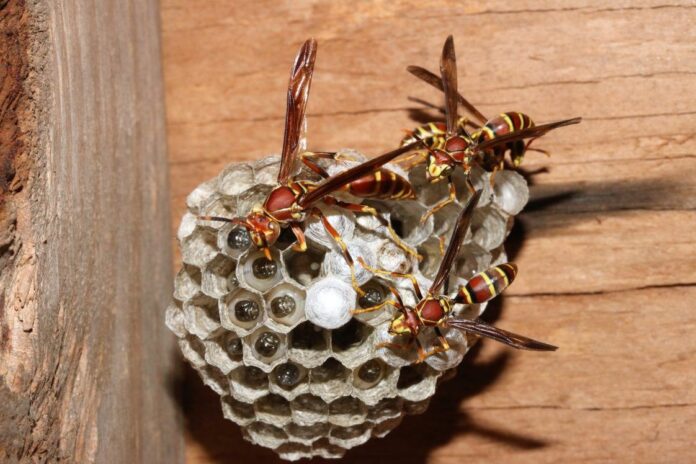AUBURN UNIVERSITY, Ala. – In today’s digital world, information is at everyone’s fingertips. However, not all of that information is accurate or safe. In a recent, viral TikTok trend, people are using cups of gasoline to cover and kill wasps around their home. An Alabama Cooperative Extension System entomologist calls this wasp-killing trend dangerous.
Not worth the risks
Xing Ping Hu, an Alabama Extension entomology and plant pathology specialist, said using gasoline as a method of control is harmful both to humans and the environment.
“People might attempt to kill wasps using methods that they think are handy or cool without realizing the associated risks,” Hu said. “Holding a cup of gasoline up to a wasp nest is a very dangerous and inefficient way to deal with wasps.”
Wasps often build their nests in overhead locations, such as along the edge of houses, buildings and porches. If people use gasoline to kill wasps, they would more than likely have to hold this highly flammable and hazardous liquid above their heads and hope that it doesn’t spill on them.
“The cup containing gasoline is not sturdy at all,” Hu said. “The gasoline could easily spill out, leak through the container or evaporate. If it contacts your skin, face, eyes or mouth, you could inhale it or it could penetrate the skin, causing serious-to-fatal health problems. Also, gasoline falling on the ground can contaminate the soil and create fire hazards.”
As if gasoline isn’t dangerous enough, imagine what happens if you miss covering the nest with the container. Wasps are not aggressive unless you bother their nests. If you don’t cover the nest on your first try, the wasps will go into attack mode, likely leading to several stings.
Hu said yellow jackets are the most common wasps that people encounter. Yellow jackets are highly aggressive and responsible for almost all of the stinging deaths in the United States.
“Unlike other stinging insects, yellow jackets like to sting people,” Hu said. “Yellow jackets do not lose their stinger, so each insect can sting repeatedly and generally attack in large numbers. They are especially dangerous in the summer.”
So, if you are thinking about joining in on this viral trend, you must first ask yourself: Is it worth facing a swarm of angry wasps?
Proper control methods
Luckily, there are several safe ways to control wasps around the home. Hu said, ideally, people should remove nests when they are small and only have a few wasps to deal with.
“You may be able to knock a nest down and dispose of it before the queen lays eggs,” Hu said. “You can use an insecticide to kill the wasps before removal. Remember to wear protective clothing for this job.”
When using insecticides, treat either early in the morning before the wasps fly out or later in the evening when all the wasps have returned. Hu said the most useful tool for management is a dust applicator. Hand dusters and air dusters are the more common applicators.
“Air dusters carry the particles deep into cavities and voids of the nests,” Hu said. “The dust particles remain on the concealed surfaces awaiting contact with foraging wasps, which, in turn, contaminates other nest mates.”
If you choose to use a liquid spray, make sure to aim the chemical into the nest entrance so the product reaches the nesting area.
More information
For more information about wasps, and other stinging insects, visit www.aces.edu or contact your county Extension office.
























